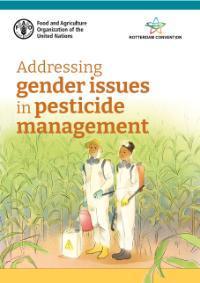
This publication addresses the role of women in handling hazardous pesticides in agriculture, the reasons why they are at higher risk and the health-related implications they face. While exposure to pesticides affects both women and men, women’s exposure to pesticides tends to be higher than recognized, and cases of poisoning often go unreported, particularly in low-income countries that rely on less sophisticated agricultural technologies. Moreover, gender-related dimensions are often overlooked in pesticide management policies and programmes.
The research highlights health-related implications of hazardous pesticide use, pesticide exposure during different stages of women's lives, economic and social factors aggravating women’s exposure to pesticides, and presents the following actions needed to advance the gender and pesticide agenda:
- Raise awareness and disseminate information on gender and pesticide risks at global, regional and national levels
- Support gender-sensitive occupational safety and health research on pesticide exposure and its adverse effects, for better evidence-based policies
- Build the capacities of partners and FAO members to collect and disseminate sex-disaggregated data on pesticide exposure scenarios and impacts
- Support the integration of gender dimensions in international frameworks for the management of pesticides and other chemicals
- Sensitize community-based organizations to the gender-specific risks of hazardous pesticides and to the related needs of vulnerable groups and women
- Promote sustainable farming practices that do not rely on the use of hazardous pesticides, building on women’s knowledge of and role in the management of natural resources
- Encourage the promotion of safety and health measures in agriculture, and promote decent employment for all
- Create an enabling environment to improve women’s access to pesticide-related services, such as information, training and health care
